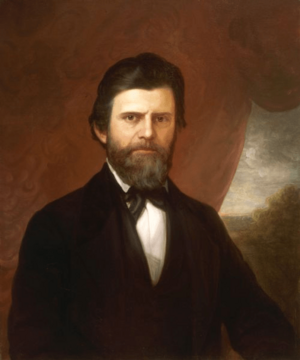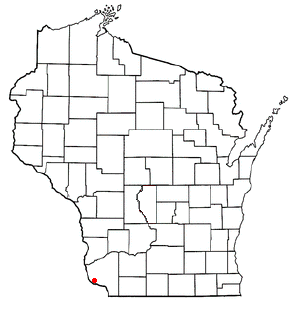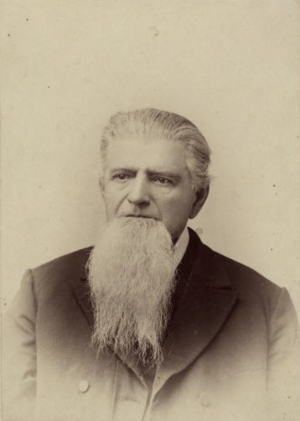Nelson Dewey facts for kids
Quick facts for kids
Nelson Dewey
|
|
|---|---|

Portrait from Wisconsin Historical Society
|
|
| 1st Governor of Wisconsin | |
| In office June 7, 1848 – January 5, 1852 |
|
| Lieutenant | John E. Holmes Samuel W. Beall |
| Preceded by | Henry Dodge (as Territorial Governor) |
| Succeeded by | Leonard J. Farwell |
| Member of the Wisconsin Senate from the 16th district |
|
| In office January 2, 1854 – January 7, 1856 |
|
| Preceded by | James Wilson Seaton |
| Succeeded by | J. Allen Barber |
| 12th President of the Council of the Wisconsin Territory | |
| In office January 5, 1846 – January 4, 1847 |
|
| Preceded by | Moses M. Strong |
| Succeeded by | Horatio Wells |
| 7th Speaker of the Legislative Assembly of the Wisconsin Territory | |
| In office August 3, 1840 – December 7, 1840 |
|
| Preceded by | Edward V. Whiton |
| Succeeded by | David Newland |
| Member of the Council of the Wisconsin Territory from Grant County | |
| In office December 5, 1842 – January 4, 1847 Serving with John H. Rountree
|
|
| Preceded by | James Russell Vineyard |
| Succeeded by | Orris McCartney |
| Member of the House of Representatives of the Wisconsin Territory for Grant County | |
| In office November 26, 1838 – December 5, 1842 Serving with Daniel Raymond Burt (1840-42) & Neely Gray (1840-42)
|
|
| Preceded by | Position established |
| Succeeded by | Franklin Z. Hicks, Alonzo Platt, & Glendower M. Price |
| Personal details | |
| Born |
Nelson Webster Dewey
December 19, 1813 Lebanon, Connecticut, U.S. |
| Died | July 21, 1889 (aged 75) Cassville, Wisconsin, U.S. |
| Resting place | Dewey Cemetery Lancaster, Wisconsin |
| Political party | Democratic |
| Spouse |
Catherine D. Dunn
(m. 1849–1889) |
| Children |
|
| Parents |
|
| Relatives |
|
| Profession | lawyer |
Nelson Webster Dewey (born December 19, 1813 – died July 21, 1889) was an American lawyer and politician. He was a pioneer in Wisconsin and became the state's very first governor. Before Wisconsin became a state, he also worked in its territorial government. Dewey played a big role in developing the town of Cassville, Wisconsin, hoping it might even become the state capital one day.
Contents
Early Life & Education
Nelson Dewey was born in Lebanon, Connecticut, on December 19, 1813. His parents were Ebenezer and Lucy Dewey. His family had lived in New England since the 1600s.
When Nelson was one year old, his family moved to Butternuts, New York (now called Morris). He went to school there and in Louisville, New York. At age 16, he attended Hamilton Academy in Hamilton, New York, for three years. After that, he returned to Butternuts to teach.
Becoming a Lawyer
Nelson's father, Ebenezer, was a lawyer and wanted Nelson to follow in his footsteps. Nelson started studying law in 1833. He learned from his father and then from other law firms.
In 1836, he moved to the lead-mining area of Galena, Illinois. He worked as a clerk for a company that bought and sold land. A week later, he moved to Cassville, Wisconsin, and became a citizen of the territory.
Early Career in Wisconsin
The company Dewey worked for had bought the land where Cassville was built. They wanted to make Cassville a big city. They even hoped it would become the capital of the Wisconsin Territory or a future state.
In 1837, Dewey was elected as the Register of Deeds for the new Grant County. He was also appointed as a Justice of the Peace. He was a member of the Democratic Party throughout his political career.
When the company's plans for Cassville didn't work out, Dewey moved to Lancaster, Wisconsin, in 1838. There, he became a lawyer and was appointed district attorney for Grant County. He worked with another lawyer, J. Allen Barber, from 1840 to 1848. They became well-known in the lead-mining region, investing in mines and mining companies.
Serving in the Territorial Government
In November 1838, Dewey was elected to the territorial assembly, representing Grant County. He was re-elected in 1840 and served as the speaker for one session. He stayed an assemblyman until 1842.
Then, voters elected him to the territorial council. In 1846, he became the council's president. This was when they were discussing the new constitution for Wisconsin to become a state. He lost his re-election in 1846 because another political party, the Whigs, gained more power in Grant County.
Becoming Wisconsin's First Governor
The 1848 Election
As Wisconsin was getting ready to become a state, the Democratic Party needed to choose a candidate for governor. The party was divided into two main groups. They couldn't agree on a candidate.
So, they chose Nelson Dewey as a compromise candidate. He wasn't strongly connected to either group. They also hoped he would win votes in Grant County, which was mostly Whig at the time.
The election was held on May 8, 1848. Dewey won, defeating two other candidates. This made him the very first governor of the State of Wisconsin! John E. Holmes, also a Democrat, became the lieutenant governor.
Governor Dewey's First Term (1848-1850)
Governor Dewey's first term started on June 7, 1848. During this time, he helped Wisconsin change from a territory to a new state. He worked to improve the state's transportation, like building new roads, railroads, canals, and harbors. He also wanted to improve the Fox and Wisconsin Rivers for travel.
Dewey was against the spread of slavery into new states. He also believed that U.S. Senators should be chosen by a popular vote (meaning people vote directly for them).
Near the end of his first term, he married Catherine Dunn. She was the daughter of Charles Dunn, who had been the chief justice of the Wisconsin Territory.
The 1849 Election & Second Term
The Wisconsin Legislature decided that elections for governor would happen every two years, starting in 1849. In November 1849, Dewey ran again and won. He defeated Alexander Collins and Warren Chase. Samuel W. Beall became the new lieutenant governor.
In the same year, Dewey was elected the first president of the Wisconsin Historical Society. His second term as governor began on January 7, 1850, and ended on January 5, 1852.
During his time as governor, Dewey lost some public support. This was partly because he couldn't fix the disagreements within his own party. Also, the lead-mining regions, where he was from, were losing political power in Wisconsin. Because of this, he decided not to run for a third term.
Life After Governorship
After being governor, Dewey went back to Lancaster. He continued to invest in real estate. He stayed active in politics and was a delegate to many Democratic Party meetings.
In 1853, he was elected to the Wisconsin State Senate for a two-year term. From 1854 to 1865, he was a regent (a member of the governing board) of the University of Wisconsin. He also served on the town board and school board in Lancaster.
Developing Cassville
In 1854, Dewey and his wife, Catherine, started planning to develop Cassville again. In 1855, he bought the village and worked to improve it. He repaired the Denniston House, a hotel, spending a lot of money. He still hoped Cassville would become a large city.
Dewey also bought a large area of land near Cassville. He built a beautiful three-story mansion called "Stonefield" and spent a lot of money on it. It was said to be the most modern house in Wisconsin at the time. He hired many men to work for him, which helped the people of Cassville.
Dewey lived in Cassville for the rest of his life, except for a few years when he lived in Platteville, Wisconsin. He ran for lieutenant governor in 1863 but lost. He also tried to get re-elected to the State Senate in 1869 and 1871, but he was not successful.
Challenges and Later Years
Dewey's plans for Cassville didn't attract as many people as he hoped. He then invested in a railroad line to the village. Sadly, in 1873, his mansion was destroyed in a fire. He had to give up his property to pay his debts. In the same year, he lost all his money invested in the railroad during a financial crisis called the Panic of 1873.
Dewey returned to his law practice. In 1874, Governor William R. Taylor appointed him to the board of directors for the State Prison at Waupun. He served there until 1881.
On February 22, 1889, Dewey had a stroke while at court. He became paralyzed and was brought home to Cassville. He passed away on July 21, 1889, at the Denniston House, the hotel he had helped rebuild. He was 75 years old.
Nelson Dewey was once a very wealthy man, but by the time he died, he had lost most of his money. He was buried in the Episcopal cemetery in Lancaster, next to his brother Orin and his son Charlie.
Family Life
Nelson Dewey married Catherine Dunn in 1849. They had three children:
- Katie (who later married and became Katie Cole)
- Nelson Jr.
- Charlie (who passed away as a child)
Dewey had two brothers, William and Orin. Another brother, John J. Dewey, was a doctor and served in the Minnesota Territorial Legislature.
Nelson Dewey was known for being very generous and was often called a "friend of the poor."
Political Beliefs
Nelson Dewey was a member of the Democratic Party. He was against the spread of slavery into new states and territories. He also believed that United States senators should be elected directly by the people. He was described as one of "the old guard that never surrendered," meaning he stuck to his beliefs.
Lasting Impact
- Nelson Dewey State Park was created in 1935 on land that was once part of Dewey's Stonefield estate.
- A part of Wisconsin State Highway 81, from Cassville to Highway 35 in Grant County, is named the Nelson Dewey Memorial Highway.
- The former Nelson Dewey Generating Station (a power plant) was also named after him.
 | Selma Burke |
 | Pauline Powell Burns |
 | Frederick J. Brown |
 | Robert Blackburn |



